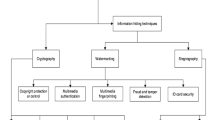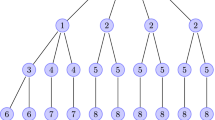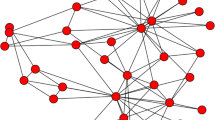Abstract
For a long time, store-and-forward had been the transport mode in network communications. In other words, information had been regarded as a commodity that only needs to be routed through the network, possibly with replication at the intermediate nodes. In the late 1990’s, a new concept called network coding fundamentally changed the way a network can be operated. Under the paradigm of network coding, information can be processed within the network for the purpose of transmission. It was demonstrated that compared with store-and-forward, the network throughput can generally be increased by employing network coding. Since then, network coding has made significant impact on different branches of information science. The impact of network coding has gone as far as mathematics, physics, and biology. This expository work aims to be an introduction to this fast-growing subject with a detailed discussion of the basic theoretical results.
Similar content being viewed by others
References
Yeung R W, Zhang Z. Distributed source coding for satellite communications. IEEE Transactions on Information Theory, 1999, 45(4): 1111–1120
Ahlswede R, Cai N, Li S-Y R, Yeung R W. Network information flow. IEEE Transactions on Information Theory, 2000, 46(4): 1204–1216
Li S-Y R, Yeung R W, Cai N. Linear network coding. IEEE Transactions on Information Theory, 2003, 49(2): 371–381
Yeung R W, Cai N. Network error correction, Part I: Basic concepts and upper bounds. Communications in Information and Systems, 2006, 6(1): 19–36
Cai N, Yeung R W. Network error correction, Part II: Lower bounds. Communications in Information and Systems, 2006, 6(1): 37–54
Koetter R, Kschischang F R. Coding for errors and erasures in random network coding. IEEE Transactions on Information Theory, 2008, 54(8): 3579–3591
Wu Y, Chou P A, Kung S-Y. Information exchange in wireless networks with network coding and physical-layer broadcast. In: Proceedings of 2005 Conference on Information Science and Systems. The Johns Hopkins University, 2005
Katti S, Rahul H, Hu W, Katabi D, Médard M, Crowcroft J. XORs in the air: Practical wireless network coding. IEEE/ACM Transactions on Networking, 2008, 16(3): 497–510
Gkantsidis C, Rodriguez P R. Network coding for large scale content distribution. In: Proceedings of IEEE INFOCOM 2005. Miami, FL, 2005
Rasala Lehman A. Network coding. Dissertation for the Doctoral Degree. Cambridge, MA: Massachusetts Institute of Technology, 2005
Cai N, Yeung R W. Secure network coding. In: Proceedings of 2002 IEEE International Symposium on Information Theory. Lausanne, 2002
Cai N, Yeung R W. Secure network coding. submitted to IEEE Transactions on Information Theory
Dougherty R, Freiling C, Zeger K. Networks, matroids, and non-Shannon information inequalities. IEEE Transactions on Information Theory, 2007, 53(6): 1949–1969
Wu Y, Jain K, Kung S-Y. A unification of network coding and tree-packing (routing) theorems. IEEE Transactions on Information Theory (Joint Special Issue of IEEE Transactions on Information Theory and IEEE/ACM Transactions on Networking on Networking and Information Theory), 2006, 52(6): 2398–2409
Mohsenian-Rad A H, Huang J, Wong V W S, Jaggi S, Schober R. A game-theoretic analysis of inter-session network coding. In: Proceedings of IEEE International Conference on Communications 2009. Dresden, 2009
Lun D S, Ratnakar N, Médard M, Koetter R, Karger D R, Ho T, Ahmed E, Zhao F. Minimum-cost multicast over coded packet networks. IEEE Transactions on Information Theory (Joint Special Issue of IEEE Transactions on Information Theory and IEEE/ACM Transactions on Networking on Networking and Information Theory), 2006, 52(6): 2608–2623
Hayashi M, Iwama K, Nishimura H, Raymond R, Yamashita S. Quantum network coding. Lecture Notes in Computer Science, 2007, 4393: 610–621
Liu J-Q. On information-theoretical formalization of intracellular communications based on linear network coding. In: Proceedings of SICE Annual Conference 2007. Kagawa University, 2007
Joint Special Issue on Networking and Information Theory. IEEE Transactions on Information Theory and IEEE/ACM Transactions on Networking, 2006, 52(6)
Special Issue on Cooperation in Wireless Networks. Springer-Wireless Personal Communications, 2007, 43(1)
Special Issue on Multiuser Cooperative Diversity for Wireless Networks. EURASIP Journal on Wireless Communications and Networking, 2006
Special Issue on Network Coding. Journal of Communications and Networks, 2008, 10(4)
Special Issue on Network Coding for Wireless Communication Networks. IEEE Journal on Selected Areas in Communications, 2009, 27(5)
Special Issue on Network Coding for Wireless Networks. EURASIP Journal on Wireless Communications and Networking, 2010, Apr
Special Issue on Physical Layer Network Coding for Wireless Cooperative Networks. EURASIP Journal on Wireless Communications and Networking, 2010, Jul
Effors M, Koetter R, Médard M. Breaking network logjams. Scientific American, 2007, 296(6): 78–85
Graham-Rowe D. Repackaging data could ‘double internet speed’. New Scientist, 2008, 2 Oct, 24–25
Shannon C E. A Mathematical theory of communication. The Bell System Technical Journal, 1948, 27: 379–423, 623–656
Yeung R W. Information Theory and Network Coding. Springer, 2008
Bertsekas D, Gallager R. Data Networks. 2nd ed. Englewood Cliffs, NJ: Prentice-Hall, 1992
Kurose J F, Ross K W. Computer Networking: A Top-Down Approach Featuring the Internet. 3rd ed. Addison Wesley, 2004
Hui J Y. Switching and Traffic Theory for Integrated Broadband Networks. Springer, 1990
Li S-Y R. Algebraic Switching Theory and Broadband Applications. Academic Press, 2000
Cheung K-M, Woo S, Stoenescu T, Chang C S, Klimesh M, Dolinar S, Cheng M K. Improved In Situ Communications Using Network Coding. Annual Report, JPL Task #R.07.023.014
Zhang S L, Liew S C, Lam P P. Physical-layer network coding. In: Proceedings of the Twelfth Annual International Conference on Mobile Computing and Networking (Mobi-Com 2006). Los Angeles, CA, 2006
Yeung R W. Multilevel diversity coding with distortion. IEEE Transactions on Information Theory, 1995, 41(2): 412–422
McEliece R J. Finite Fields for Computer Scientists and Engineers. Kluwer Academic Publishers, 1987
Lin S, Costello D J Jr. Error Control Coding: Fundamentals and Applications. Prentice-Hall, 1983 (2nd ed. 2004)
Blahut R E. Theory and Practice of Error Control Codes. Reading, MA: Addison-Wesley, 1983
Wicker S B. Error Control Systems for Digital Communication and Storage. Englewood Cliffs, NJ: Prentice-Hall, 1995
Fong S L, Yeung R W. Variable-rate linear network coding. In: Proceedings of 2006 IEEE Information Theory Workshop. Chengdu, 2006, 409–412
Toledo A L, Wang X. Efficient multipath in sensor networks using diffusion and network coding. In: Proceedings of the 40th Annual Conference on Information Sciences and Systems. Princeton, NJ: Princeton University, 2006, 87–92
Koetter R, Médard M. An algebraic approach to network coding. IEEE/ACM Transactions on Networking, 2003, 11(5): 782–795
Jaggi S, Sanders P, Chou P A, Effros M, Egner S, Jain K, Tolhuizen L. Polynomial time algorithms for multicast network code construction. IEEE Transactions on Information Theory, 2005, 51(6): 1973–1982
Ho T, Koetter R, Médard M, Karger D R, Effros M. The benefits of coding over routing in a randomized setting. In: Proceedings of 2003 IEEE International Symposium on Information Theory. Yokohama, 2003, 442
Cohen B. Incentive build robustness in BitTorrent. In: Proceedings of the 1st Workshop on Economics of Peer-to-Peer Systems. Berkeley, CA, 2003
Liu Z, Wu C, Li B, Zhao S. UUSee: Large-scale operational on-demand streaming with random network coding. In: Proceedings of IEEE INFOCOM 2010. San Diego, CA, 2010
Yeung R W. Avalanche: A network coding analysis. Communications in Information and Systems, 2007, 7(4): 353–358
Byers J, Luby M, Mitzenmacher M. A digital fountain approach to asynchronous reliable multicast. IEEE Journal on Selected Areas Communications, 2002, 20(8): 1528–1540
Yeung R W, Li S-Y R, Cai N, Zhang Z. Network coding theory. Foundations and Trends in Communications and Information Theory, 2005, 2(4 and 5): 241–381
Fraleigh J B. A First Course in Abstract Algebra. 7th ed. Addison Wesley, 2003
Erez E, Feder M. Convolutional network codes. In: Proceedings of 2004 IEEE International Symposium on Information Theory. Chicago, IL, 2004, 146
Erez E, Feder M. Convolutional network codes for cyclic networks. In: Proceedings of the First Workshop on Network Coding, Theory, and Applications (NetCod 2005). Riva del Garda, 2005
Fragouli C, Soljanin E. Information flow decomposition for network coding. IEEE Transactions on Information Theory, 2006, 52(3): 829–848
Barbero Á I, Ytrehus Ø. Cycle-logical treatment for “cyclopathic” networks. IEEE Transactions on Information Theory (Joint Special Issue of IEEE Transactions on Information Theory and IEEE/ACM Transactions on Networking on Networking and Information Theory), 2006, 52(6): 2795–2804
Li S-Y R, Yeung R W. On convolutional network coding. In: Proceedings of 2006 IEEE International Symposium on Information Theory. Seattle, WA, 2006, 1743–1747
Li S-Y R, Ho S T. Ring-theoretic foundation of convolutional network coding. In: Proceedings of the FourthWorkshop on Network Coding, Theory and Applications. Hong Kong, 2008, 1–6
Zhang Z, Yeung R W. On characterization of entropy function via information inequalities. IEEE Transactions on Information Theory, 1998, 44(4): 1440–1452
Fragouli C, Soljanin E. Network coding fundamentals. Foundations and Trends in Networking, 2007, 2(1): 1–133
Ho T, Lun D S. Network Coding: An Introduction. Cambridge University Press, 2008
Author information
Authors and Affiliations
Corresponding author
Additional information
Raymond W. Yeung was born in Hong Kong on June 3, 1962. He received the B.S., M.Eng., and Ph.D. degrees in electrical engineering from Cornell University, Ithaca, NY, in 1984, 1985, and 1988, respectively.
He was a Member of Technical Staff of AT&T Bell Laboratories from 1988 to 1991. Since 1991, he has been with the Department of Information Engineering, The Chinese University of Hong Kong, where he is now a chair professor. He is also a Changjiang Chair Professor at Xidian University (2009–2012) and an Advisory Professor at Beijing University of Post and Telecommunications (2008–2011). He has held visiting positions at Cornell University, Nankai University, the University of Bielefeld, the University of Copenhagen, Tokyo Institute of Technology, and Munich University of Technology. He was a Consultant in a project of Jet Propulsion Laboratory, Pasadena, CA, for salvaging the malfunctioning Galileo Spacecraft and a Consultant for NEC, USA.
He is the author of the textbooks A First Course in Information Theory (Kluwer Academic/Plenum 2002) and its revision Information Theory and Network Coding (Springer 2008). His research interests include information theory and network coding.
Dr. Yeung was a member of the Board of Governors of the IEEE Information Theory Society from 1999 to 2001. He has served on the committees of a number of information theory symposiums and workshops. He was General Chair of the First and the Fourth Workshop on Network, Coding, and Applications (NetCod 2005 and 2008), a Technical Co-Chair for the 2006 IEEE International Symposium on Information Theory, and a Technical Co-Chair for the 2006 IEEE Information Theory Workshop. He currently serves as an Editor-at-Large of Communications in Information and Systems, an Editor of Foundation and Trends in Communications and Information Theory and of Foundation and Trends in Networking, and was an Associate Editor for Shannon Theory of this Transactions from 2003 to 2005. He was a recipient of the Croucher Foundation Senior Research Fellowship for 2000/2001, the Best Paper Award (Communication Theory) of the 2004 International Conference on Communications, Circuits and System (with C. K. Ngai), the 2005 IEEE Information Theory Society Paper Award (for his paper “Linear network coding” coauthored with S.-Y. R. Li and N. Cai), and the Friedrich Wilhelm Bessel Research Award of the Alexander von Humboldt Foundation in 2007. He is a Fellow of the IEEE and the Hong Kong Institution of Engineers.
Since January 2010, Dr. Yeung has been serving as a Co-Director of the Institute of Network Coding at The Chinese University of Hong Kong.
About this article
Cite this article
Yeung, R.W. Network coding theory: An introduction. Front. Electr. Electron. Eng. China 5, 363–390 (2010). https://doi.org/10.1007/s11460-010-0103-1
Received:
Accepted:
Published:
Issue Date:
DOI: https://doi.org/10.1007/s11460-010-0103-1




